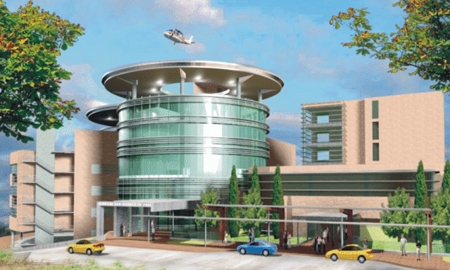“Hospital San Vincente de Paul was founded by generosity and generosity itself has been maintaining the hospital,” says Julio Toro, general director of Fundacion San Vincente de Paul.
Hospital San Vincente de Paul was founded 100 years ago by a man who belonged to one of the most renowned families from Medellin. He said to himself when his wife fell ill, “If I, having money, suffer with my wife being sick, what is it like for poor people?” He went on to found the biggest hospital in Antioquia which has been able to assist all of Antioquia’s children regardless of social class. “When he died, he left a legacy in the institution,” Mr. Toro says.
Since its founding, Hospital San Vincente de Paul has functioned as a non-profit private institution, generating benefits for the community and serving people with limited resources. It operates in a duty-free zone so costs are reduced and services become cheaper. The community definitely appreciates the institution, as it has an open-door policy and does not exclude anyone from its services.
The hospital makes sure that all their healthcare professionals are educated, training much of their staff from the University of Antioquia. “Here, they find a way to carry out their internships with high quality and a generous reception,” Mr. Toro says. “As a result, we are deeply related to Colombian people’s feelings.”
Mr. Toro believes that the hospital will be used long into the future due to its connection to the community and foundation of generosity that has kept it alive for many years. He not only foresees the hospital’s long-term success, but he also welcomes future expansion and care for foreigners as they build a new clinic at Rio Negro.
“We cannot expand in this place and therefore we bought some land next to the airport to build specialized centers in areas we know, such as transplants, cardiovascular matters, emergency service and appointments,” he says.
The Hospital San Vincente de Paul holds patient safety in the highest esteem, as it is backed by the best medical expertise and comparable to other high quality medical institutions. “We have efficiency, efficacy indicators, as well as hospital mortality indicators comparable to the best hospitals worldwide,” Mr. Toro says. “We assure healthcare risks are avoided, namely, intra-hospital infection, which our hospital was the first to manage. We assure patient safety.”
The hospital has made great developmental contributions to the community and has become a long-standing quality hospital serving the region. “If I had to go through the emergency room, I would ask to be sent to this hospital,” Mr. Toro says. “There is no greater guarantee than that.”

0 COMMENTS